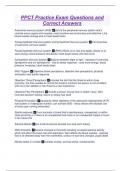PPCT Practice Exam Questions and
Correct Answers
Autonomic nervous system (ANS) ✅part of the peripheral nervous system and it
controls many organs and muscles, most functions are involuntary and reflective. Like
blood vessles change size or heart beats faster
Parasympathetic Nervous system and Sympathetic Nervous system ✅Two branches
of autonomic nervous system
Parasympathetic Nervous system ✅(PNS) Allows us to rest and digest, allows us to
save energy, blood pressure decreases, heart beats slower with less force
Sympathetic Nervous System ✅Balance between flight or fight - releases 2 hormones
epinephrine and nor epinephrine - vital to stress response - uses more energy, blood
pressure increases, heart beats faster
SNS Triggers ✅Objective threat perceptions, objective fear perceptions, physical
exhaustion and startle response
Objective Threat Perceptions ✅includes the fact that the threat is within close
proximity, the time needed to control the threat is minimal, the person is not confident
with his or her abilities or the threat is a new experience
Objective Fear Perceptions ✅Include a person having frear or death, injury, killin,
incorrect decision making, failure or simply fear itself
Physical Exhaustion ✅caused by either depletion of the adenosine triphosphotel (ATP)
fuel system or inadequate nutrition, can activate SNS - many officers will escalate use
of force upon coming exhausted
Startle response ✅if you encouter a threat that is spontaneous, unexpected, or within
close proximity or if there is an unexpected loud noise or an unexpected impact or touch
it can cause this
Adrenal Glands ✅two small structures situated one atop each kidney
SNS Activation ✅Several changes to the body including increased adrenal activity
which will effect the heart rate and respiration. Also affects the blood vessles - vascular
flow is re-directed away from the extremities, contour of eye lens changes, pupils dilate
Mental states in combat ✅Combat anxiety, survival stress, combat stress
, Combat anxiety ✅the anticipation of danger - may lead to a gradual deterioration of
both mental and physical skills
Survival stress ✅deadly force threat perception that initiates the SNS discharge
Combat stress ✅post event mental and physiological symptions that are a result of the
sns activation and the sudden return to the pns
PNS Backlash ✅may distort the memory - deals with the sudeden treturn to the PNS
after the result of SNS activation
Backlash triggers ✅the perception that the threat has diminished, the perception there
has been an injury, trauma to a vital system, or exhaustion of the aerobic and anaerobic
systems
Symptoms of backlash ✅dizziness, excessiv e bleeding and symptoms of shock,
including paleness, nausea, excessive sweating and clammy skin, as well as an
overwhelming sense of exhaustion or excessive muscle tremors
Critical incident amnesia ✅a form of temporary amnesia subsequent to a sns mass
discharge, which includes the release of the stress hormone cortisol - will affect memory
and ability to write an incident report
Combat performance variables ✅mindset, motor skill selection, nutrition & hydration,
fitness and belief system
Mindset ✅one variable that will affect combat performance. Includes a belief in the
mission and committment to completing it.
Motor skill selection ✅is critical to fear management. If simple skills are taught and
practiced, a person will become more confident in his/her abilities and will be more apt
to control fear
Fitness ✅an integral component of survival and sue of force training...enhances a
person's ability to control a subject and survive and contributes to to long-term health
Survival stress symptoms ✅rapid breathing, cottonmouth, muscular tremors, increased
heart rate, sweaty palms, visual difficulty and loss of ability to concentrate are all
symptoms of
Reduce survival stress tips ✅they include having a strong confidence factor, proper
motor skill selection, using tactical breathing techniques, using visualization techniques,
and having a strong faith factor






